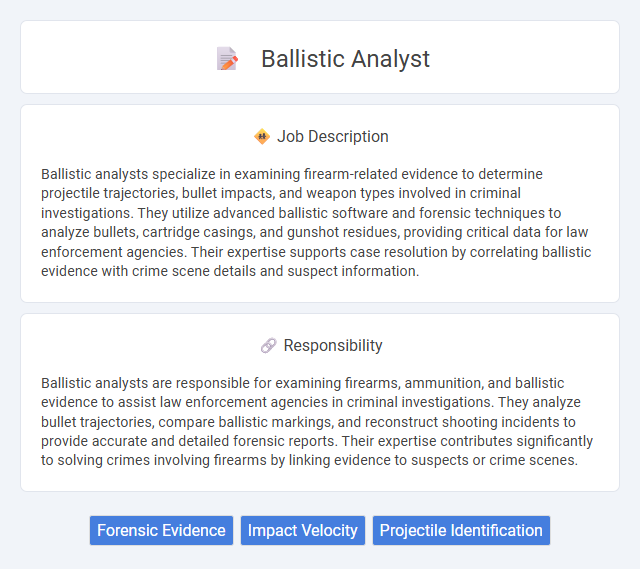
Ballistic analysts specialize in examining firearm-related evidence to determine projectile trajectories, bullet impacts, and weapon types involved in criminal investigations. They utilize advanced ballistic software and forensic techniques to analyze bullets, cartridge casings, and gunshot residues, providing critical data for law enforcement agencies. Their expertise supports case resolution by correlating ballistic evidence with crime scene details and suspect information.
Individuals with strong analytical skills and attention to detail are likely well-suited for a Ballistic Analyst role, as the job demands precise examination of projectile trajectories and impact patterns. People who can maintain focus under pressure and exhibit patience in conducting meticulous forensic analysis may find this field compatible with their abilities. Those lacking critical thinking or struggling with repetitive data evaluation might encounter difficulties adapting to the role's requirements.
Qualification
A Ballistic Analyst typically requires a strong background in forensic science, physics, or criminal justice, with a bachelor's degree as a minimum qualification. Proficiency in ballistic software, firearms examination, and crime scene investigation techniques is crucial for accurate analysis. Certification from organizations like the Association of Firearm and Tool Mark Examiners (AFTE) enhances credibility and career advancement.
Responsibility
Ballistic analysts are responsible for examining firearms, ammunition, and ballistic evidence to assist law enforcement agencies in criminal investigations. They analyze bullet trajectories, compare ballistic markings, and reconstruct shooting incidents to provide accurate and detailed forensic reports. Their expertise contributes significantly to solving crimes involving firearms by linking evidence to suspects or crime scenes.
Benefit
A Ballistic Analyst role likely offers significant benefits including specialized skill development in forensic science and law enforcement techniques. This position may provide opportunities for collaboration with investigative teams, enhancing career prospects in criminal justice fields. Competitive salaries and potential for advancement could also be probable advantages in this career.
Challenge
A Ballistic Analyst job likely involves complex problem-solving tasks that require analyzing ballistic evidence to support criminal investigations. The challenge may stem from the need to interpret intricate data accurately under tight deadlines, where precision is critical to legal outcomes. Probability plays a role as analysts must assess the likelihood of various ballistic trajectories or matches to provide reliable conclusions.
Career Advancement
Ballistic analysts leverage expertise in firearms, ammunition, and trajectory analysis to support criminal investigations and enhance public safety. Career advancement opportunities include roles such as senior ballistic analyst, forensic science supervisor, or crime lab director, often requiring specialized certifications and advanced degrees in forensic science or criminal justice. Continuous skill development in digital ballistics imaging and ballistic database management drives professional growth and increased leadership responsibilities in forensic departments.
Key Terms
Forensic Evidence
A Ballistic Analyst specializes in examining firearms, ammunition, and related evidence to support criminal investigations. They analyze bullet trajectories, cartridge casings, and gunshot residue to link weapons to crime scenes or suspects. Their forensic expertise is crucial in reconstructing shooting incidents and providing credible evidence in court.
Impact Velocity
Ballistic analysts specialize in determining impact velocity to reconstruct shooting incidents and assess projectile behavior. Precise measurement of impact velocity aids in understanding bullet trajectory, energy transfer, and terminal ballistics, which are crucial for forensic investigations. Advanced tools and software, including high-speed cameras and Doppler radar, enable ballistic analysts to calculate accurate impact velocities for crime scene analysis.
Projectile Identification
A Ballistic Analyst specializing in Projectile Identification uses advanced forensic techniques and ballistic databases to match recovered projectiles to specific firearms. They analyze markings, trajectory data, and material composition to provide critical evidence in criminal investigations. Proficiency in firearms technology and forensic ballistics software is essential for accurate projectile classification and case resolution.
 kuljobs.com
kuljobs.com